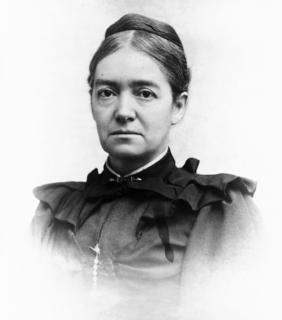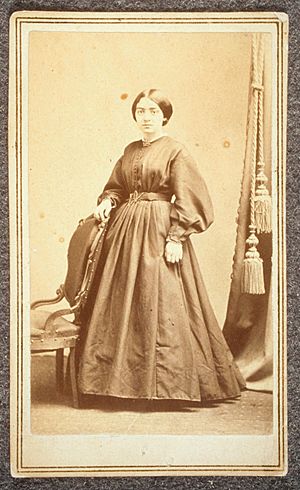Mary Putnam Jacobi facts for kids
Quick facts for kids
Mary Putnam Jacobi
|
|
|---|---|
 |
|
| Born |
Mary Corinna Putnam
August 31, 1842 London, UK
|
| Died | June 10, 1906 (aged 63) |
| Nationality | American |
| Education | Female (later Women's) Medical College of Pennsylvania Faculté de Médecine de Paris |
| Known for | Medicine |
| Spouse(s) | Abraham Jacobi (m. 1873) |
| Children | Marjorie Jacobi McAneny |
| Parent(s) | George Palmer Putnam and Victorine Haven |
| Family | (brothers) George Haven Putnam, John Bishop Putnam, Herbert Putnam |
Mary Corinna Putnam Jacobi (born August 31, 1842 – died June 10, 1906) was an amazing American doctor, teacher, scientist, writer, and a supporter of women's right to vote. She was the first woman to study medicine at the famous University of Paris.
Mary had a long career helping people as a doctor, teaching others, writing, and fighting for women's rights. She especially wanted women to have better chances in medical education. Mary believed in using strong scientific research to answer medical questions, rather than just old ideas.
Contents
Early Life and Education
Mary Corinna Putnam was born on August 31, 1842, in London, England. Her father, George Palmer Putnam, was American, and her mother, Victorine Haven Putnam, was from New York City. Mary was the oldest of eleven children. Her family was in London because her father was setting up a new office for his publishing company.
In 1848, when Mary was six, her family moved back to New York. She grew up there and spent most of her early years learning at home from her mother. Later, she went to a private school in Yonkers. She then attended a public school for girls in Manhattan, graduating in 1859. After school, she studied Greek, science, and medicine privately. One of her teachers was the famous doctor Elizabeth Blackwell.
As a teenager, Mary enjoyed writing. She published short stories in The Atlantic Monthly when she was only fifteen. She also wrote for the New York Evening Post.
Becoming a Doctor
Mary always wanted to be a doctor, even though her father thought it was a "repulsive pursuit" for a woman. Still, he agreed to help her pay for her studies. In 1863, Mary Jacobi made history by becoming the first woman to graduate from a United States school of pharmacy, the New York College of Pharmacy.
In 1864, she earned her medical degree (M.D.) from the Woman's Medical College of Pennsylvania. For a few months, she worked as a doctor at the New England Hospital for Women and Children. She also helped during the American Civil War as a medical aide.
Mary wanted to learn even more about medicine. She decided to apply to the École de Médecine at the University of Paris. This was a very big deal! In 1868, after a lot of effort and help from a psychiatrist named Benjamin Ball, she was accepted. She was the first woman student ever admitted there. However, because she was a woman, she had to enter lectures through a separate door and sit at the front of the class.
In July 1871, Mary Jacobi graduated with honors from the École de Médecine. She was the second woman to get a degree from that university. She even won a bronze medal for her important medical paper.
Career and Advocacy
After five years of studying in Paris, Mary returned to the United States in 1871. She moved back to New York City and opened her own private medical practice. She also did research and became a professor at the new Women's Medical College of the New York Infirmary.
Mary Jacobi was a pioneer for women in medicine. She became the second woman to join the Medical Society of the County of New York. She was also accepted into the American Medical Association. In 1872, she helped start the Women's Medical Association of New York City and was its president for many years.
She strongly believed that leading medical schools, like Johns Hopkins, should allow women to study there. She taught at the Medical College, but her lessons were often too advanced for her students, so she left in 1888. During her lifetime, Dr. Jacobi was seen as the most accomplished woman doctor.
In 1873, she married Abraham Jacobi, a doctor from New York. He is often called the "father of American pediatrics" because of his work with children. Mary and Abraham had three children, but sadly, two of them died young. Only their daughter, Marjorie Jacobi McAneny, lived to adulthood. Mary taught her daughter herself, using her own ideas about education.
In 1876, Mary Jacobi won a special award called the Boylston Prize from Harvard University for an original essay she wrote.
Writing and Legacy
Mary Jacobi wrote over 120 medical articles and nine books. She stopped writing fiction in 1871. In 1891, she wrote about the history of women doctors in the United States for a book called Women's Work in America. This included a list of her own many works.
In 1894, she wrote an important book called Common Sense Applied to Women's Suffrage. This book was later reprinted and used to help the women's suffrage movement in the United States. This movement fought for women's right to vote. After women's suffrage was defeated in New York State in 1894, Jacobi helped create the League for Political Education.
Mary Jacobi had a different view from Elizabeth Blackwell, another pioneering woman doctor. Blackwell thought women would succeed in medicine because they were caring. But Jacobi believed that women's contributions to all medical fields should be just as valued as men's.
When Mary Jacobi was diagnosed with a brain tumor, she carefully wrote down all her symptoms. She then published a paper about it called Descriptions of the Early Symptoms of the Meningeal Tumor Compressing the Cerebellum. From Which the Writer Died. Written by Herself. She passed away in New York City on June 10, 1906. Mary Jacobi is buried at Green-Wood Cemetery in Brooklyn, New York.
In 1993, Mary Putnam Jacobi was honored by being inducted into the National Women's Hall of Fame.
Selected Works
- Acute Fatty Degeneration of New Born (1878)
- The Value of Life (New York, 1879)
- Cold Pack and Anæmia (1880)
- The Prophylaxis of Insanity (1881)
- "Studies in Endometritis" in the American Journal of Obstetrics (1885)
- Articles on "Infantile Paralysis" and "Pseudo-Muscular Hypertrophy" in Pepper's Archives of Medicine (1888)
- Hysteria, and other Essays (1888)
- Physiological Notes on Primary Education and the Study of Language (1889)
- "Common Sense" Applied to Women's Suffrage (1894)
- Found and Lost (1894)
- From Massachusetts to Turkey (1896)
- Description of the Early Symptoms of the Meningeal Tumor Compressing the Cerebellum. From Which the Writer Died. Written by Herself. (1906)
See also
 In Spanish: Mary Corinna Putnam Jacobi para niños
In Spanish: Mary Corinna Putnam Jacobi para niños


